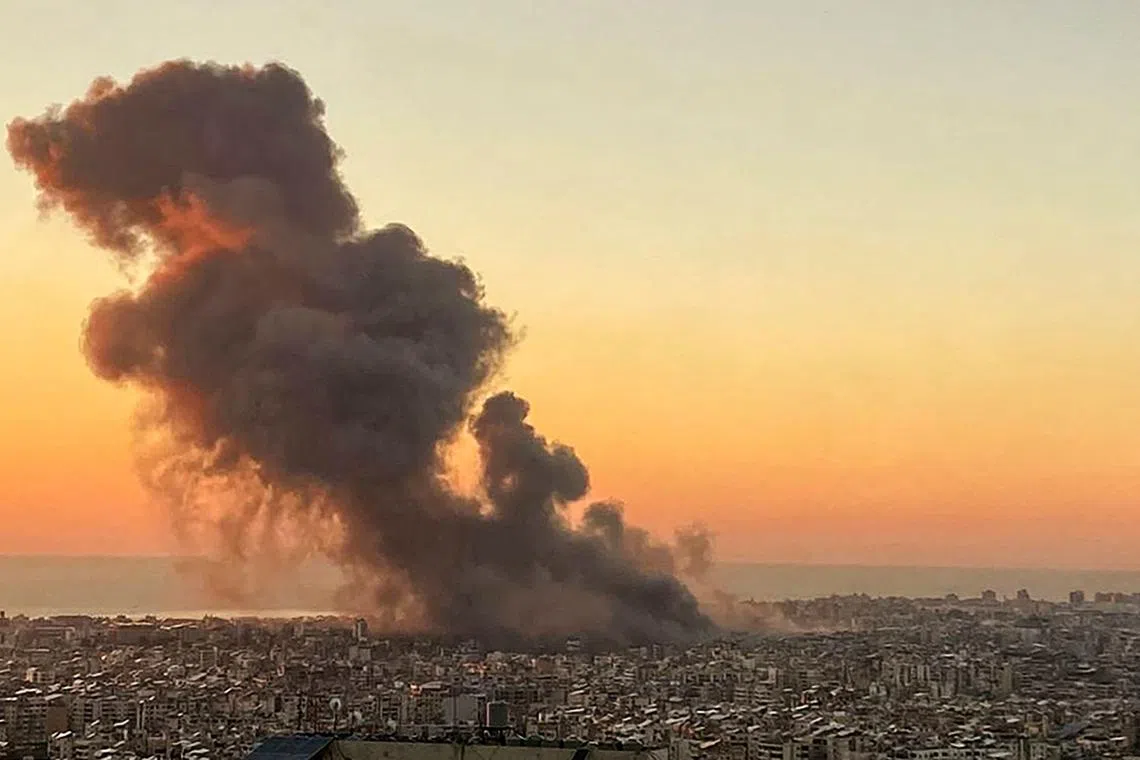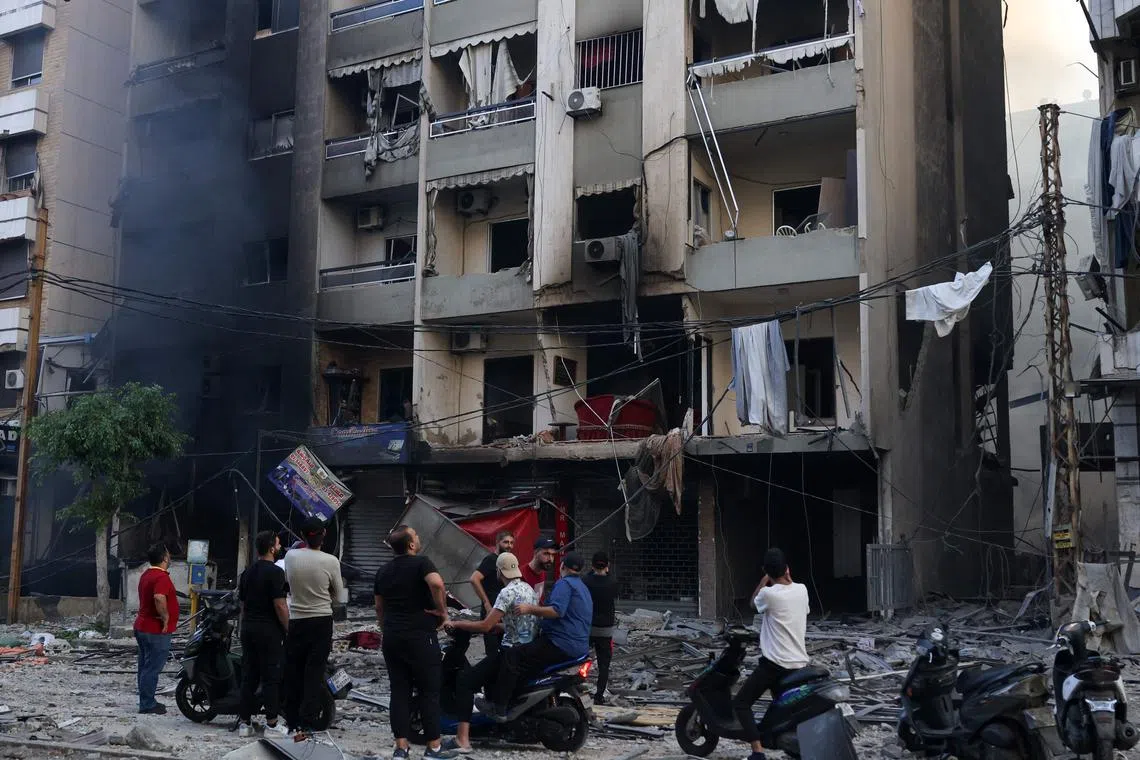Hezbollah chief killed in Israeli strike on Beirut
Sign up now: Get ST's newsletters delivered to your inbox
BEIRUT/JERUSALEM – Israel has killed Hezbollah leader Hassan Nasrallah in a powerful air strike in Beirut, dealing a huge blow to the Iran-backed group as it reels from an escalating campaign of Israeli attacks.
Hezbollah on Sept 28 confirmed earlier announcements by Israel’s military that it had killed Nasrallah in an air strike on Beirut’s southern suburbs
In a statement, Hezbollah said: “Sayyed Hassan Nasrallah, secretary-general of Hezbollah, has joined his great, immortal martyr comrades whom he led for about 30 years.”
The statement confirmed Nasrallah was killed with other members of the group “following the treacherous Zionist strike on the southern suburbs” of Beirut.
Hezbollah gave no immediate indication of who might succeed Nasrallah.
Senior Hezbollah official Hashem Safieddine has long been regarded as the heir apparent.
The group has not issued any statement on his status or that of any other Hezbollah leaders – apart from Nasrallah – since the attack.
In central Beirut, AFP journalists heard a passer-by screaming “oh my God”, while women wept in the streets right after Hezbollah announced Nasrallah’s death.
Before his death was confirmed, a source close to Hezbollah said that contact with the group’s leader had been lost since the evening of Sept 27.
Israeli military spokesman Nadav Shoshani announced on X: “Hassan Nasrallah is dead.”

Smoking billowing in Beirut’s southern suburbs during an Israeli strike on Sept 27.
PHOTO: AFP
Military spokesman Daniel Hagari, in a televised briefing, called Nasrallah “one of the greatest enemies of the state of Israel of all time” and added that “his elimination makes the world a safer place”.
A military statement said the strikes also killed Ali Karaki, whom the statement identified as commander of Hezbollah’s southern front, and an unspecified number of other Hezbollah commanders.
“The strike was conducted while Hezbollah’s senior chain of command were operating from the headquarters and advancing terrorist activities against the citizens of the state of Israel,” the statement said.
“During Hassan Nasrallah’s 32-year reign as the secretary-general of Hezbollah, he was responsible for the murder of many Israeli civilians and soldiers, and the planning and execution of thousands of terrorist activities.
“He was responsible for directing and executing terrorist attacks around the world in which civilians of various nationalities were murdered. Nasrallah was the central decision maker and the strategic leader of the organisation.”
After announcing Nasrallah’s death, the Israeli military said the country was on high alert for a broader conflict, as Hezbollah continued its cross-border rocket fire on Sept 28, setting off sirens and sending residents running for shelter deep inside Israel.
Israeli missile defences blocked some of them and there was no immediate report of injuries.
Leaders in the region have condemned Israel’s killing of the Hezbollah chief.
Iraq’s Prime Minister Mohammed Shia al-Sudani said the Sept 27 attack on Beirut was a “shameful attack” and “a crime that shows the Zionist entity has crossed all the red lines”.
Iran’s Foreign Ministry, in a post on X, said the path of the Hezbollah chief will continue despite his killing, and that “his sacred goal will be realised in the liberation of Quds (Jerusalem)”.
Turkish President Recep Tayyip Erdogan condemned Israel’s recent attacks on Lebanon, and urged the UN Security Council and other bodies to stop Israel.
Palestinian militant group Hamas also condemned Nasrallah’s killing as a “cowardly terrorist act”.
Hezbollah began firing on Israel one day after Hamas’ Oct 7 attack on southern Israel
Israel has, over the past days, shifted the focus of its operation from Gaza to Lebanon, where heavy bombing has killed more than 700 people and displaced around 118,000.

The aftermath of Israel’s overnight strikes on Beirut’s southern suburbs on Sept 28.
PHOTO: AFP
Israel’s army chief, Lieutenant-General Herzi Halevi, on Sept 28 said: “The message is simple, anyone who threatens the citizens of Israel – we will know how to reach them.”
The military said it had hit more than 140 Hezbollah targets in Lebanon since the night of Sept 27.
It continued to pound Hezbollah’s south Beirut stronghold into Sept 28, sending panicked families fleeing.
Before it was confirmed, Iranian media downplayed the report from Israel of Nasrallah’s death, describing it as “rumours”.
Posters of Nasrallah were erected in Tehran bearing the slogan: “Hezbollah is alive.”
Lieutenant-Colonel Shoshani, the Israeli military spokesman, later said there was “still a way to go” in Israel’s fight against Hezbollah, adding that the group was believed to have “tens of thousands of rockets”. AFP, REUTERS


